Greenfields School is affiliated to The Council for the Indian School Certificate Examinations (CISCE), which is committed to serve the nation’s children, through high quality educational endeavours, empowering them to contribute towards a humane, just and pluralistic society, promoting introspective living, by creating exciting learning opportunities, with a commitment to excellence.

PRIMARY WING
Classes I and II & Classes III and V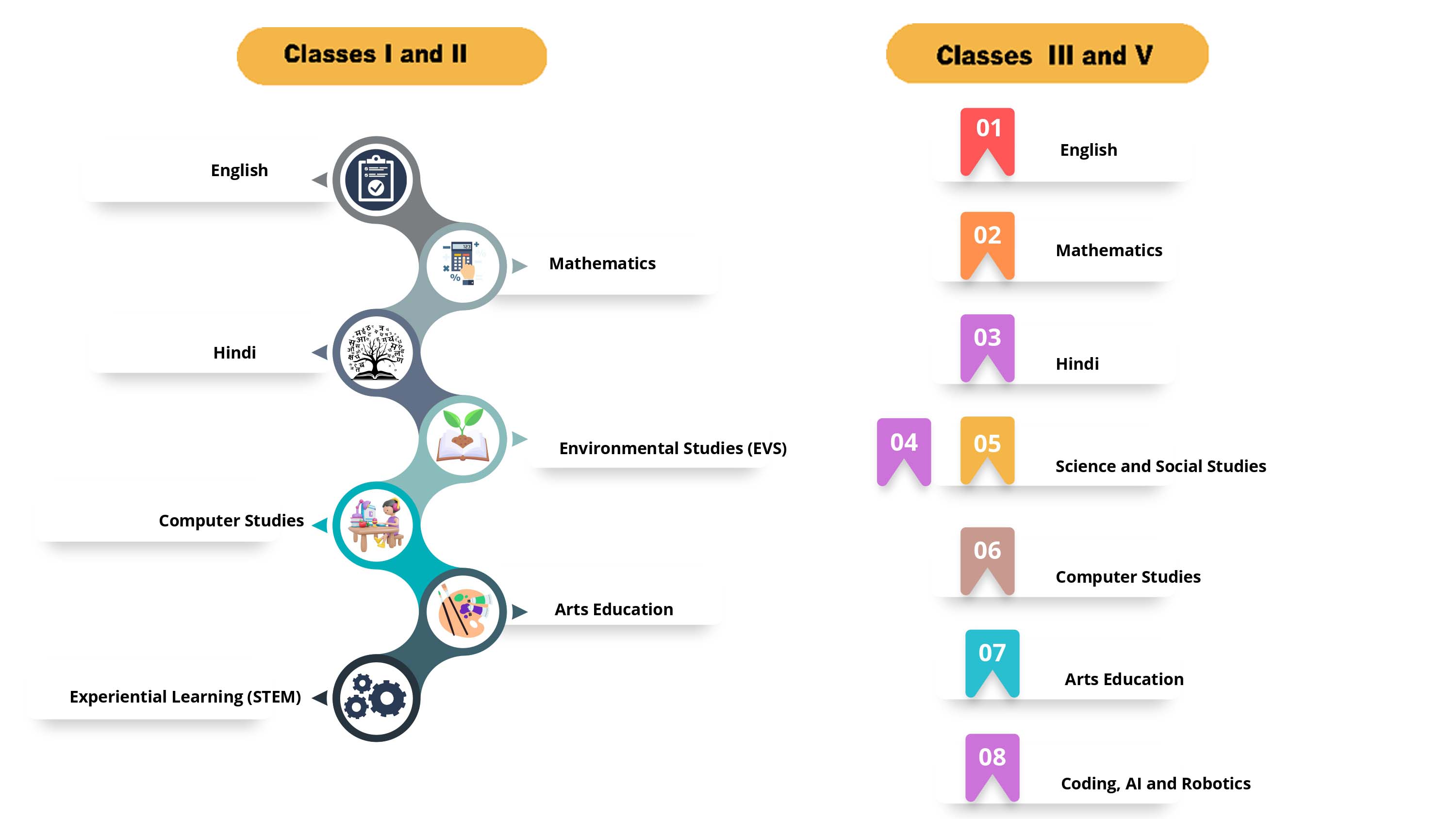

CURRICULUM OBJECTIVES
At Greenfields we believe in enabling children to realize their own potentialto excellence and to nurture their young minds through knowledge andexposure. We integrate life skills education and values-based learning intothe curriculum which emphasizes character development, social skills,ethical values, and critical thinking. We aim to make students understandand apply knowledge to real life experiences.
The goals and objectives of the primary curriculum are to foster holisticdevelopment, critical thinking, problem-solving skills, and a strongfoundation in various subjects.

TEACHINGMETHODOLOGIES
Our well trained and experienced teachers stress on reading aloud, silently,and in a group which stimulates students’ imagination and expands theirunderstanding of the world besides developing their language and listeningskills. Elocution, Role Play and Mime, Skit, Word & Number games and quiz,Dramatization are some of the tools that we adopt to enable children to thinkcritically apply learning and develop flexibility and creativity. Field trips,Training workshops & Excursions are planned in tandem with the curriculum;International and National Days are celebrated to expose the learners to widecultural diversity that broadens their horizon.
A combination of traditional teaching methods, interactive sessions, activity-based learning, project work, and the integration of technology are variousteaching tools for effective learning experiences.
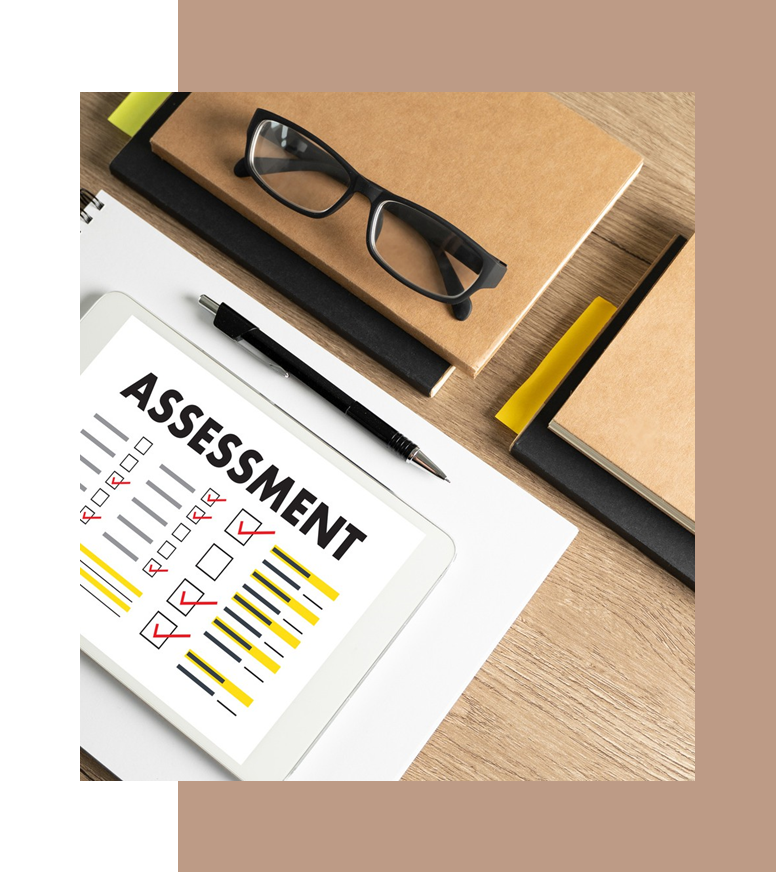
ASSESSMENT AND EVALUATION
Assessment and evaluation are necessary, important and an integral part ofthe teaching learning process in all classes.
To monitor children’s learning and performance and to monitor the progressof each child Four Assessments are scheduled in one academic sessioncomprising of Oral Assessment (Reading, Recitation, Elocution, Role Play,JAM, Quiz) and Written Assessment (Thinking & Critically analysing).
JUNIOR WING
Classes VI and VII & Classes VIIThe middle level of education is crucial as it bridges the foundational knowledge gained in primary education with the specializedlearning of higher levels. Thus, the objectives focus on comprehensive development, academic excellence, skill-building, andpreparing students to be lifelong learners and contributors to society.
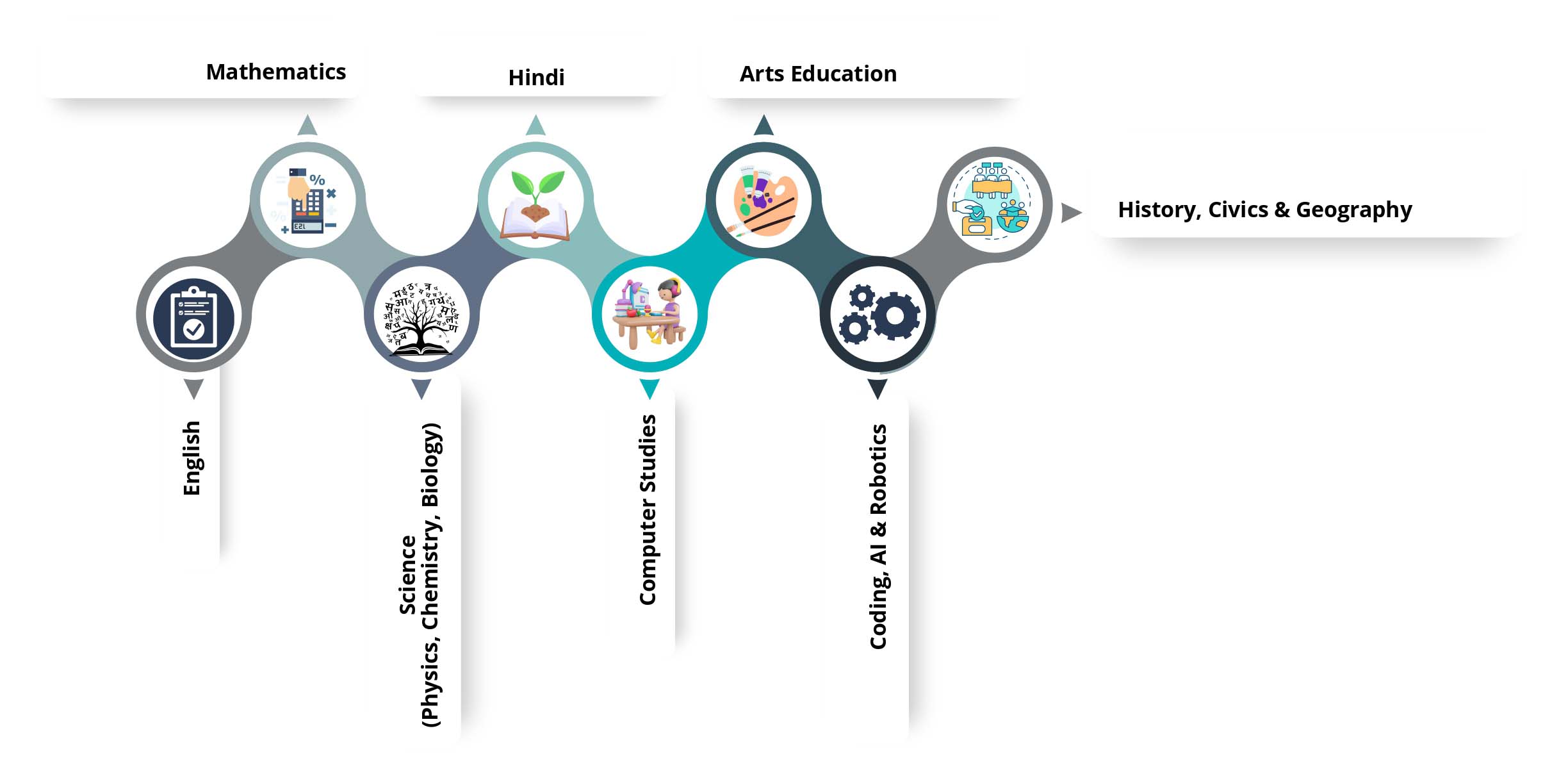
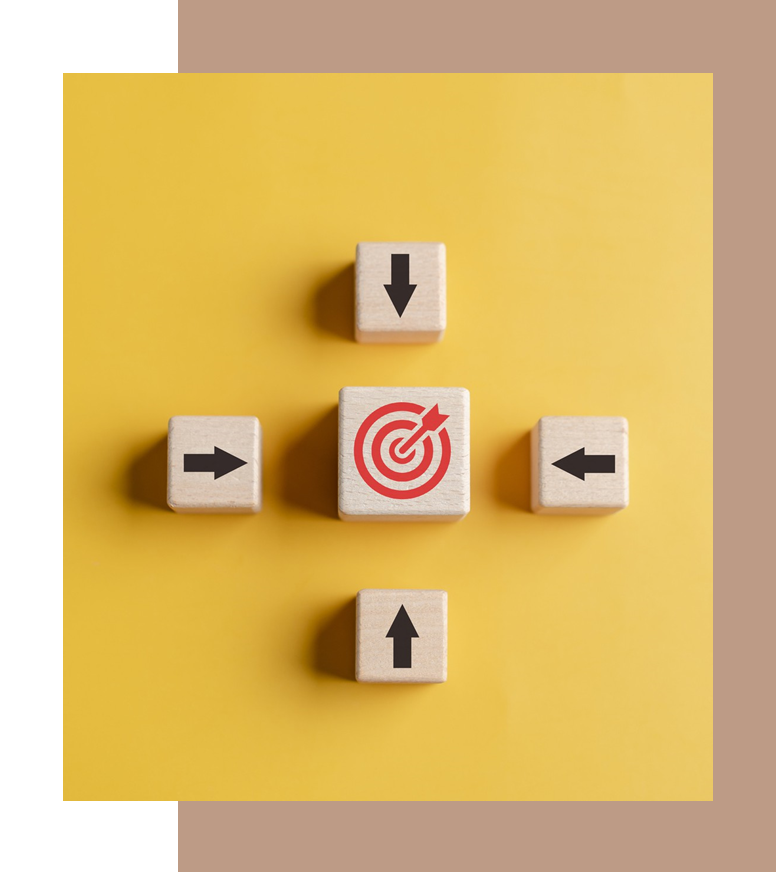
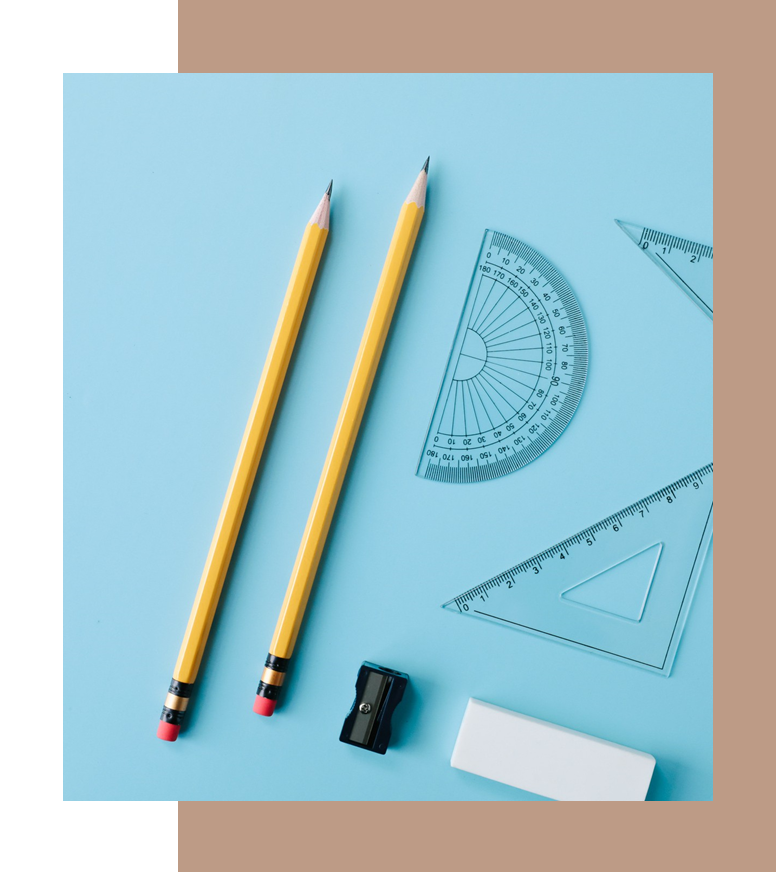
CURRICULUM OBJECTIVES
Our objectives of education at the middle level (classes 6-8) encompass a broadspectrum of aims and goals aimed at holistic development and preparingstudents for higher education and practical life.
WE AIM TO
- Build a strong foundation in core subjects like Mathematics, Science, SocialStudies, Languages (including proficiency in English), and other optionalsubjects.
- Develop critical thinking, analytical, and problem-solving skills throughpractical applications and interdisciplinary learning.
- Foster creativity, innovation, and the ability to apply knowledge in real-worldcontexts.
- Emphasize physical, mental, emotional, and social development through co-curricular and extracurricular activities.
- Encourage participation in sports, arts, music, drama, debates, clubs, andcommunity service to nurture well-rounded individuals.
- Integrate life skills such as communication, teamwork, timemanagement, decision-making, and leadership into the curriculum.
- Promote values like empathy, respect, integrity, responsibility, andenvironmental consciousness.
- Encourage tolerance, appreciation for diversity, and the ability to functionin a multicultural society.
- Introduce students to technology as a tool for learning, research, andcommunication.
- Foster digital literacy and ethical use of technology while preparingstudents for the technological demands of the future.
- Provide guidance and exposure to different professions and industries tohelp students make informed career choices
- Prepare students for the academic rigors of higher education byequipping them with advanced knowledge and skills required for furtherstudies
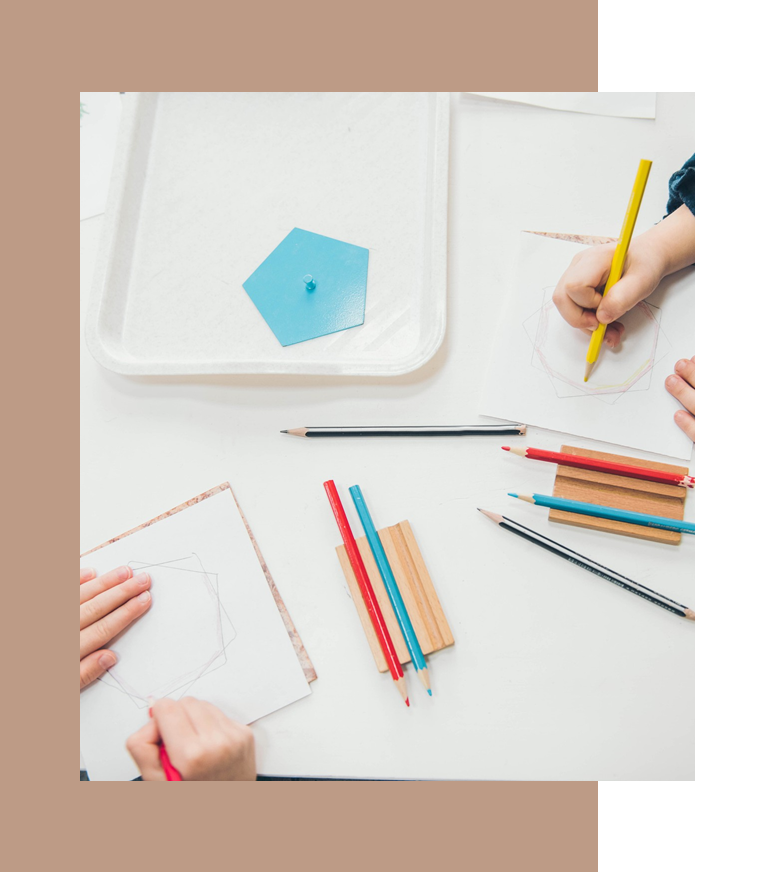
TEACHING METHODOLOGIES
Encouraging programs like do-it-yourself, student-to-student teaching, project-based learning and student-centred learning environments are our best toolsto provide learning experiences that meet individual needs. Middle schooloffers maximum flexibility in terms of experiential and experimental learning.
The inclusion of extracurricular and co-curricular activities such as sports,arts, music, clubs, debates, and community service initiatives complement theacademic curriculum and contribute to a well-rounded education. Thecurriculum is designed to adapt to changing educational needs and preparestudents for higher education by providing a strong foundation in varioussubjects and skill sets.
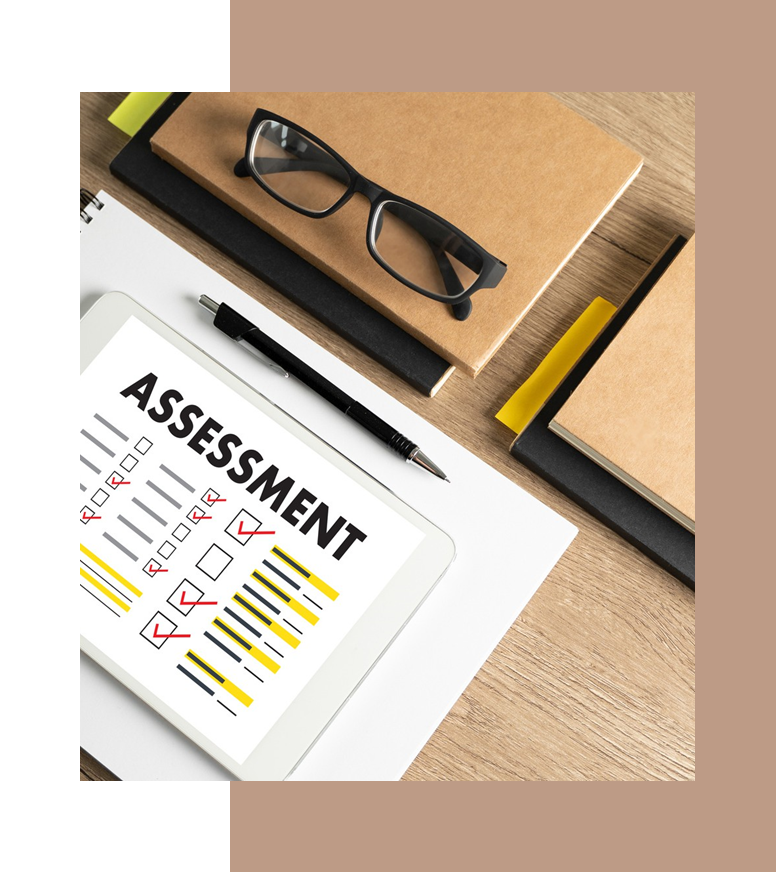
ASSESSMENT AND EVALUATION
We practise formative and summative assessments, periodic tests, projects,presentations, and continuous evaluation methods aimed at providing acomprehensive understanding of students' progress.
One Unit Test of 25 marks each is taken before Half Yearly and FinalExaminations. Oral skills like reading, elocution, role-play, JAM, quiz, and vivaare integral part of assessment.
SENIOR WING ICSE & ISC
Classes IX and X & Classes XI and XIICISCE, The Council for the Indian School Certificate Examinations, provide high-quality educational endeavours empoweringstudents to contribute towards a humane, just and pluralistic society, promotes introspective living, by creating exciting learningopportunities, with a commitment to excellence. The ICSE (classes 9-10) and an ISC (classes 11-12) curriculum provide acomprehensive education and prepare students for higher studies and future endeavours.

AIM & TEACHING METHODOLOGIES
We focus to provide a deeper understanding of subjects, critical thinking skills, and preparestudents for competitive exams and higher education.The curriculum goes beyond academicsto foster holistic development. Co-curricular and extracurricular activities like quiz, debates,elocution, sports yield leadership opportunities.
Well-equipped Physics, Chemistry and Biology laboratories enable students toexperiment individually and gather a thorough knowledge of each topic.Advanced computers, robotics kits, AI software, programming tools, 3Dprinters, microcontrollers, and sensors are available for the students in extensiveComputer and Robotics & AI labs.
Our competent faculty members guide and mentor students in exploring therealms of computer science, robotics, and artificial intelligence.
Our students participate and win laurels in inter-school hackathons, roboticscompetitions, or AI challenges. The integration of technology into every subjectand at all levels allows unprecedented levels and types of exciting collaborationand learner to learner connectivity. We emphasize the student-centred approachand individualized attention to cater to diverse learning needs.
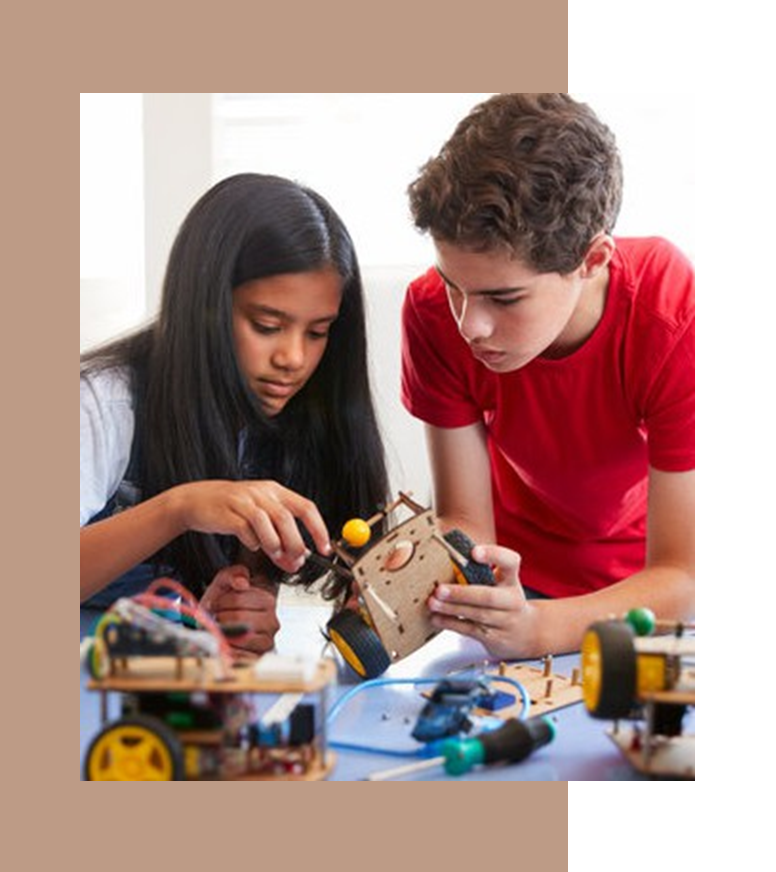
ICSE
CLASSES 9 AND 10English, History, Civics & Geography and Hindi as second language are compulsory subjects (Group I) in Classes 9 and 10. Students may choose any two subjects from the following Group II and Group III:
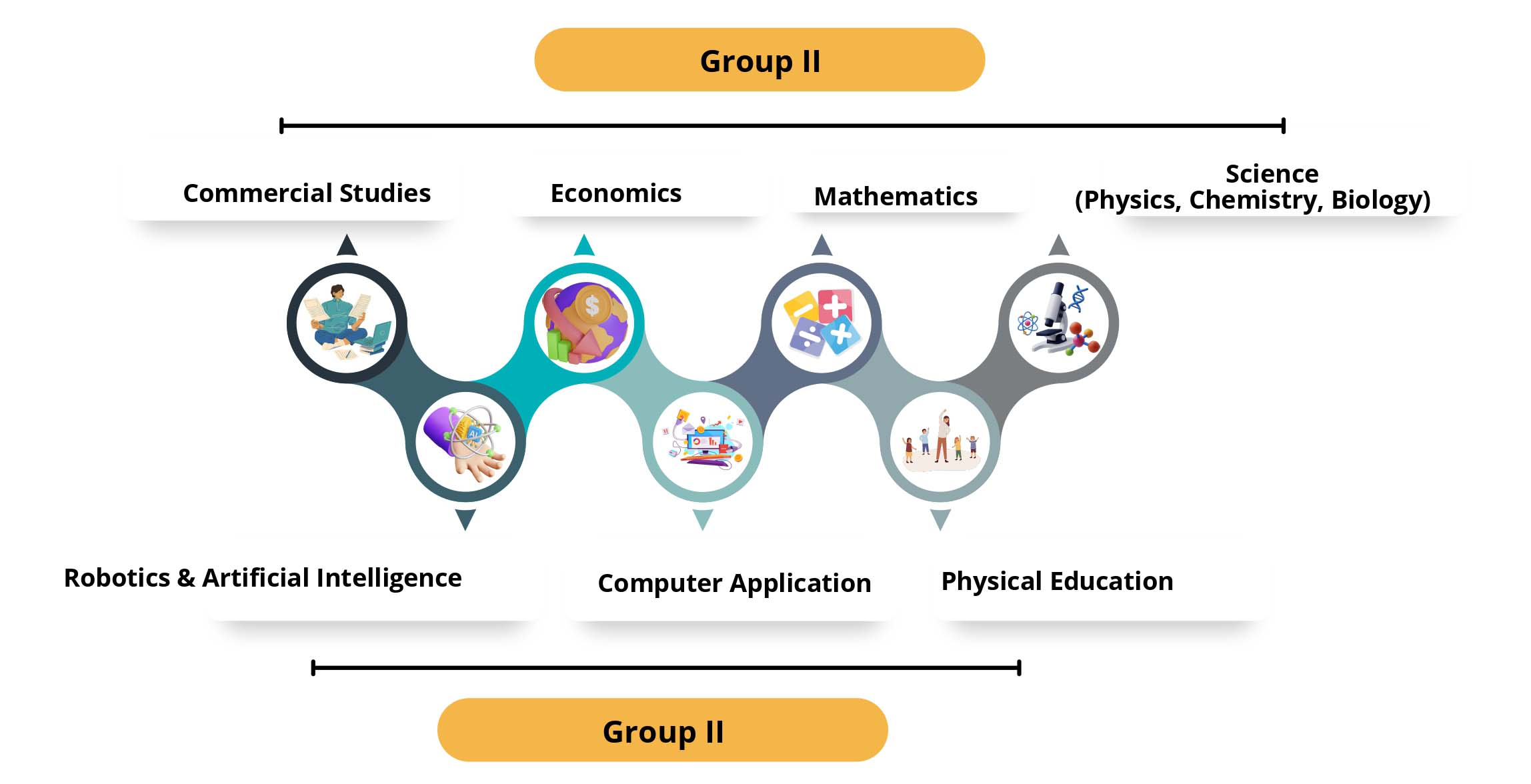
ICSE
CLASSES 11 AND 12English is a compulsory subject. We offer following subjects at ISC level. Students may choose any Four.
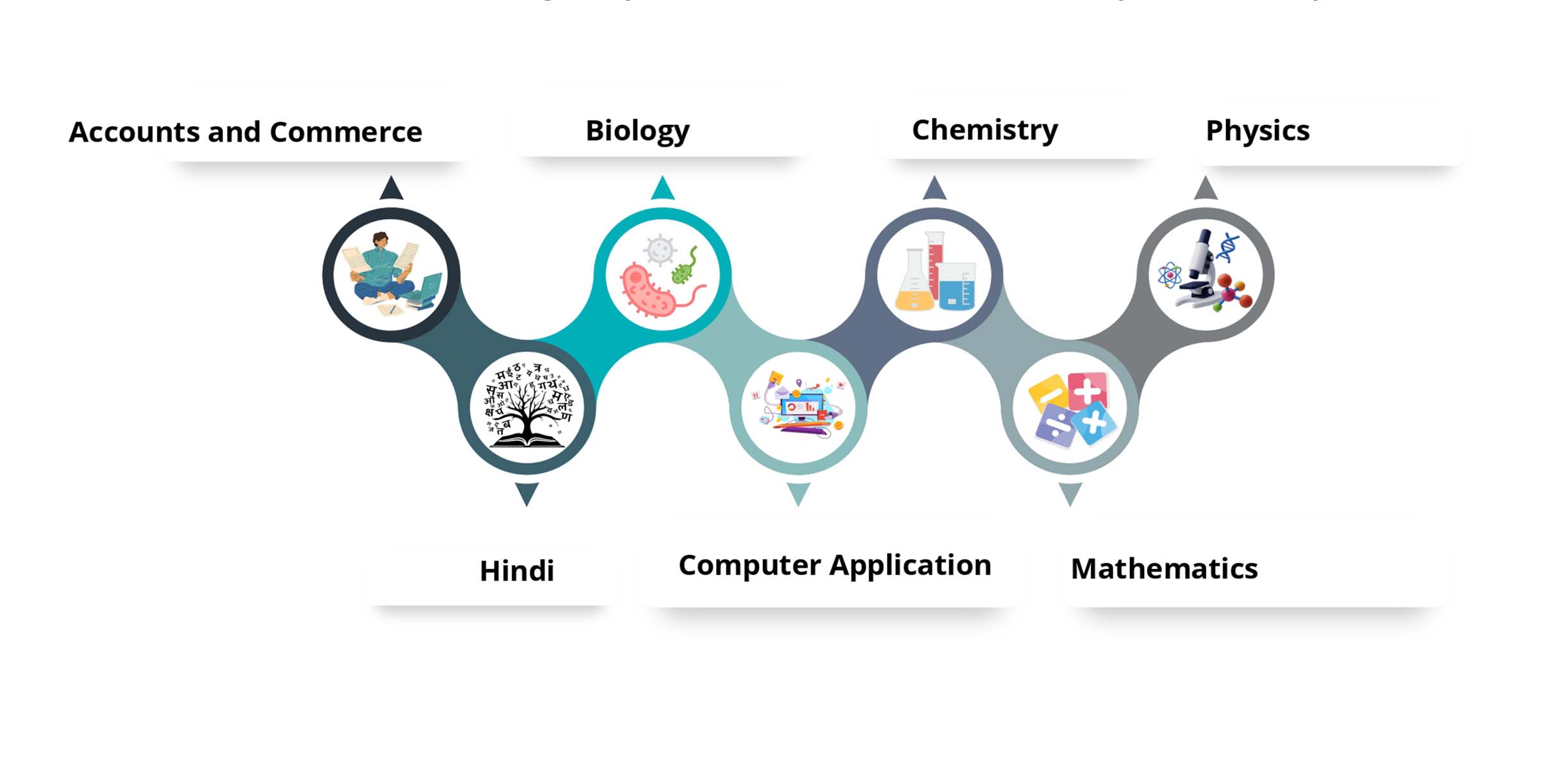
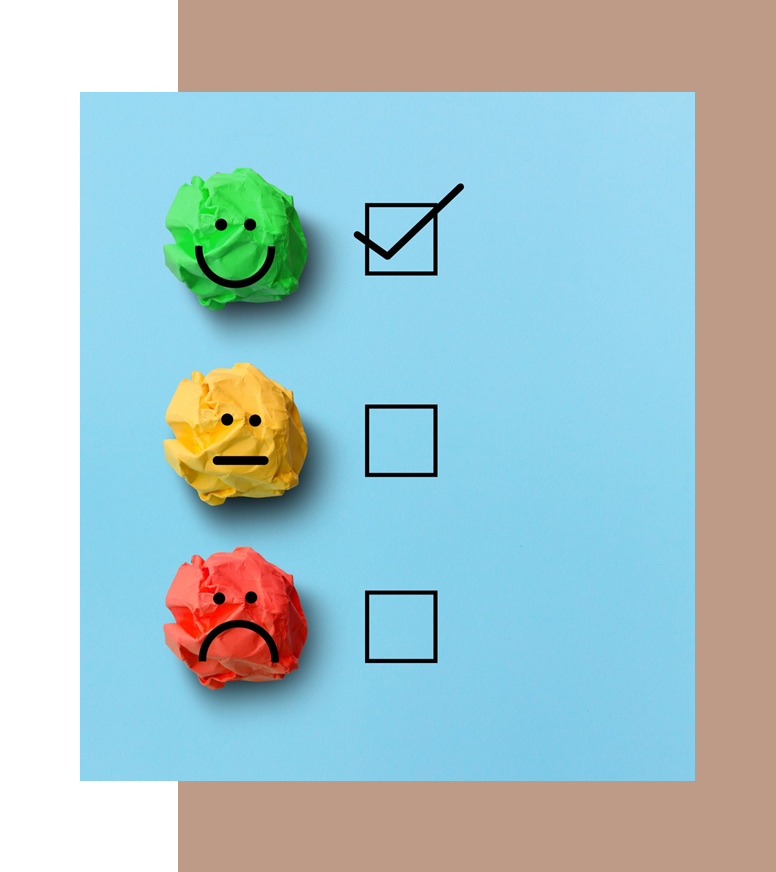
EVALUATION AND EXAMINATIONS
We strictly adhere to the CISCE guidelines in assessing the progress andpromotion of our students.
Three sets of examinations are held throughout the session and two unittests are also taken before each set of examinations.

CISCE GUIDELINES FOR CLASS IX
Internal Examination Class IX Examination: For selected subjects QuestionPapers for the Class IX Final Examination will be provided by the CISCE. TheCISCE will also set the timetable for the conduct of Class IX Final Examination inthese selected subjects. (ii) It will be the responsibility of the Head of the Schoolto ensure promotion from Class IX to Class X on the basis of the cumulativeachievement level of the student throughout the academic year in the subjectshe/she has been registered for.
For promotions, a candidate is required to have obtained at least 33% marks infive subjects (severally) including English on the cumulative average and aminimum attendance of 75% of the working days. No other criteria will be usedfor promotion from Class IX to Class X.
Promotion from Class IX to Class X on Trial basis, on Re-examination orAwarding of Grace marks is not permissible and will not be accepted by theCISCE. Transfer Certificate should not be issued with ‘Promoted to Class X’ if thestudent has not met the required promotion criteria.

CISCE GUIDELINES FOR CLASS XI
Class XI Examination: For selected subjects Question Papers for the Class XIFinal Examination will be provided by CISCE. CISCE will also set thetimetable for the conduct of Class XI Final Examination in these selectedsubjects.
(ii) It will be the responsibility of the Head of the School to ensure promotionfrom Class XI to Class XII on the basis of the cumulative achievement levelof the candidate throughout the academic year in the subjects the candidatehas been registered for. For promotions, a candidate is required to haveobtained at least 35% marks in four subjects (severally) including English onthe cumulative average and a minimum attendance of 75% of the workingdays. No other criteria will be used for promotion from Class XI to Class XII.
Promotion from Class XI to Class XII on trial basis, on Re-examination orAwarding of Grace marks is not permissible and will not be accepted byCISCE. Transfer Certificate should not be issued with ‘Promoted to Class XII’if the student has not met the required promotion criteria.


